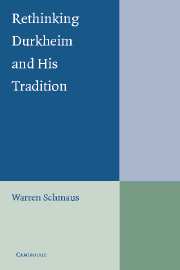Book contents
- Frontmatter
- Contents
- Preface and Acknowledgments
- 1 Durkheim and the Social Character of the Categories
- 2 Historical Background: Aristotle and Kant
- 3 The Categories in Early-Nineteenth-Century French Philosophy
- 4 The Later Eclectic Spiritualism of Paul Janet
- 5 The Early Development of Durkheim's Thought
- 6 Durkheim's Sociological Theory of the Categories
- 7 Prospects for the Sociological Theory of the Categories
- Notes
- Bibliography
- Index
4 - The Later Eclectic Spiritualism of Paul Janet
Published online by Cambridge University Press: 16 July 2009
- Frontmatter
- Contents
- Preface and Acknowledgments
- 1 Durkheim and the Social Character of the Categories
- 2 Historical Background: Aristotle and Kant
- 3 The Categories in Early-Nineteenth-Century French Philosophy
- 4 The Later Eclectic Spiritualism of Paul Janet
- 5 The Early Development of Durkheim's Thought
- 6 Durkheim's Sociological Theory of the Categories
- 7 Prospects for the Sociological Theory of the Categories
- Notes
- Bibliography
- Index
Summary
Academics sometimes trace their intellectual lineage in genealogical terms. If Cousin were to be called one of Durkheim's intellectual grandfathers, it would be because of the lineage that passes from Cousin to Durkheim through Paul Janet, who was one of the members of Durkheim's dissertation committee. Although Janet was far too young to have studied with Cousin before Cousin left teaching for administration, Janet maintained a personal relationship with Cousin for twenty-two years, beginning in 1844 when he served a year as his secretary (Janet 1885: 483–4). Janet, who held the chair in the history of philosophy at the Faculté des Lettres, was the leading representative of the eclectic spiritualist school of thought during Durkheim's early academic career (Brooks 1998: 39). He was on the committee that drafted the 1880 philosophy programme or syllabus for the lycées. His textbook, the Traité élémentaire de philosophie à l'usage des classes, covers the prescribed topics and questions in that syllabus. It was widely adopted in the lycées, went through many editions, and was even translated into Spanish. In what follows, I will be drawing my account of Janet's philosophy from this text.
Durkheim appears to have used Janet's text when he taught philosophy at the Lycée de Sens in the academic year 1883–4, the class in which André Lalande took the recently discovered notes. The other main lycée philosophy text that Durkheim knew was Élie Rabier's Leçons de Philosophie.
- Type
- Chapter
- Information
- Rethinking Durkheim and his Tradition , pp. 76 - 95Publisher: Cambridge University PressPrint publication year: 2004

